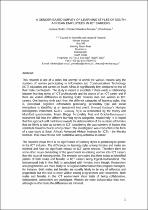 ResearchSpace
ResearchSpace
Gender-based survey of learning styles of South African employees in ICT careers
JavaScript is disabled for your browser. Some features of this site may not work without it.
- ResearchSpace
- →
- Research Publications/Outputs
- →
- Conference Publications
- →
- View Item
| dc.contributor.author |
Dlodlo, N

|
|
| dc.contributor.author |
Mvelase, PS

|
|
| dc.contributor.author |
Krause, C

|
|
| dc.date.accessioned | 2010-08-27T07:48:50Z | |
| dc.date.available | 2010-08-27T07:48:50Z | |
| dc.date.issued | 2010-01 | |
| dc.identifier.citation | Dlodlo, Mvelase , PS and Krause, C. 2010. Gender-based survey of learning styles of South African employees in ICT careers. Hawaii International Conference on Education. 7-10 January 2010, Hawaii, pp 15 | en |
| dc.identifier.uri | http://hdl.handle.net/10204/4219 | |
| dc.description | Hawaii International Conference on Education, 7-10 January 2010 | en |
| dc.description.abstract | This research is one of a series that attempt to unveil the various reasons why the numbers of women participating in Information and Communications Technology (ICT) education and careers in South Africa is significantly low compared to that of their male counterparts. The study is meant to establish if there exists a relationship between learning styles of ICT professionals and the choice of an ICT career and if there are visible differences in learning styles between men and women in ICT careers. One learning style each from the different categories of learning styles, that is, perceptual, cognitive information processing, personality type and social interactions is identified as an assessment instrument. Howard Gardner's Multiple Intelligences instrument, Kolb's Learning Style as represented by the Honey and Mumford questionnaire, Myers Briggs Personality Test and Gracha-Reichmann's instrument fall into the different learning styles categories, respectively. It is hoped that this approach will contribute towards the determination of the numbers of females that are likely to take up careers in ICT, considering the vast numbers of factors that contribute towards choices of any career. The investigation was conducted in the form of a case study at South Africa's Advanced African Institute for ICTs - the Meraka Institute. This research was both qualitative and quantitative in nature. | en |
| dc.language.iso | en | en |
| dc.subject | Learning styles | en |
| dc.subject | ICT education | en |
| dc.subject | Gender | en |
| dc.title | Gender-based survey of learning styles of South African employees in ICT careers | en |
| dc.type | Conference Presentation | en |
| dc.identifier.apacitation | Dlodlo, N., Mvelase, P., & Krause, C. (2010). Gender-based survey of learning styles of South African employees in ICT careers. http://hdl.handle.net/10204/4219 | en_ZA |
| dc.identifier.chicagocitation | Dlodlo, N, PS Mvelase, and C Krause. "Gender-based survey of learning styles of South African employees in ICT careers." (2010): http://hdl.handle.net/10204/4219 | en_ZA |
| dc.identifier.vancouvercitation | Dlodlo N, Mvelase P, Krause C, Gender-based survey of learning styles of South African employees in ICT careers; 2010. http://hdl.handle.net/10204/4219 . | en_ZA |
| dc.identifier.ris | TY - Conference Presentation AU - Dlodlo, N AU - Mvelase, PS AU - Krause, C AB - This research is one of a series that attempt to unveil the various reasons why the numbers of women participating in Information and Communications Technology (ICT) education and careers in South Africa is significantly low compared to that of their male counterparts. The study is meant to establish if there exists a relationship between learning styles of ICT professionals and the choice of an ICT career and if there are visible differences in learning styles between men and women in ICT careers. One learning style each from the different categories of learning styles, that is, perceptual, cognitive information processing, personality type and social interactions is identified as an assessment instrument. Howard Gardner's Multiple Intelligences instrument, Kolb's Learning Style as represented by the Honey and Mumford questionnaire, Myers Briggs Personality Test and Gracha-Reichmann's instrument fall into the different learning styles categories, respectively. It is hoped that this approach will contribute towards the determination of the numbers of females that are likely to take up careers in ICT, considering the vast numbers of factors that contribute towards choices of any career. The investigation was conducted in the form of a case study at South Africa's Advanced African Institute for ICTs - the Meraka Institute. This research was both qualitative and quantitative in nature. DA - 2010-01 DB - ResearchSpace DP - CSIR KW - Learning styles KW - ICT education KW - Gender LK - https://researchspace.csir.co.za PY - 2010 T1 - Gender-based survey of learning styles of South African employees in ICT careers TI - Gender-based survey of learning styles of South African employees in ICT careers UR - http://hdl.handle.net/10204/4219 ER - | en_ZA |





